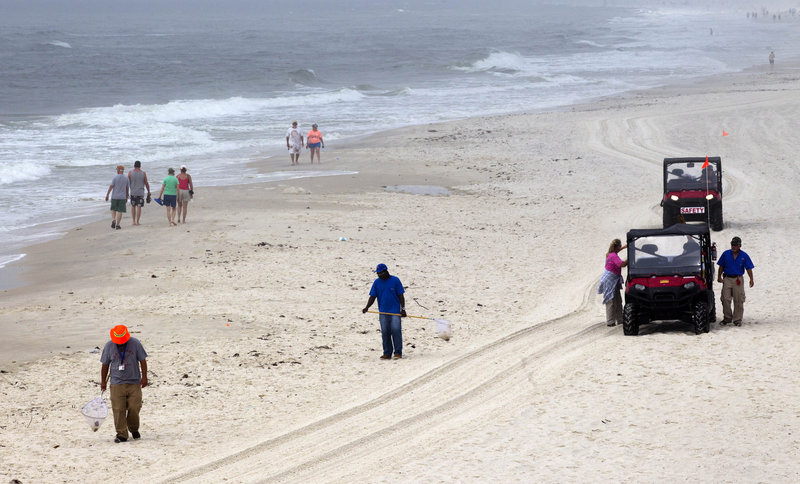NEW ORLEANS – Relatives flew over Gulf of Mexico waters Wednesday where 11 oil rig workers died a year ago, residents gathered in prayer vigils onshore and President Barack Obama vowed to hold BP and others accountable for “the painful losses that they’ve caused.”
Even as somber remembrances marked the first anniversary of the worst offshore oil spill in American history, there were reminders that lengthy legal battles lay ahead. BP filed a lawsuit alleging negligence by the maker of the device that failed to stop the spill, while the manufacturer of the blowout preventer and rig owner filed their own claims.
The disaster began on the night of April 20, 2010, when the Deepwater Horizon rig burst into flames and killed the 11 men. The rest of the crew evacuated, but two days later the rig toppled into the Gulf and sank to the sea floor. Over the next 85 days, 206 million gallons of oil – 19 times more than the Exxon Valdez spilled – spewed from the well.
Parents, siblings and wives of the workers – whose bodies were never recovered – boarded a helicopter Wednesday to see the waters where their loved ones perished. The helicopter took them from New Orleans out to the well site, circled around so that people on both sides of the aircraft could see and then returned to shore, said Arleen Weise, whose son, Adam, was killed on the rig. The only indication they were at the site was an announcement from the pilot, she said.
“It was just a little emotional, seeing where they were,” Weise said by phone from Houston, where rig owner Transocean planned an evening memorial service.
Asked what went through her mind when she saw where the rig went down, Weise said, “Just rise up. I wanted them to come up, but it didn’t happen.”
In a statement, President Obama paid tribute to those killed in the blast and said that despite significant progress toward mitigating the spill’s worst impacts, “the job isn’t done.”
“We continue to hold BP and other responsible parties fully accountable for the damage they’ve done and the painful losses that they’ve caused,” he said.
BP said in its lawsuit filed in federal court in New Orleans that Cameron International provided a blowout preventer with a faulty design, alleging that negligence by the manufacturer helped cause the disaster. The suit seeks damages to help BP pay for the tens of billions of dollars in liabilities it has incurred.
Houston-based Cameron noted in a statement emailed to AP that Wednesday was the deadline under the relevant statute for all parties to file claims against each other. It said that it has filed claims of its own to protect itself.
Also Wednesday, Transocean filed court papers demanding that judgments be made against BP, Cameron and other companies in its favor.
A presidential commission has concluded that a cascade of technical and managerial failures – including a faulty cement job – caused the disaster. BP, the oil giant which owns the blown-out well, has paid billions in cleanup costs and to compensate victims. The company has estimated its total liability at $40.9 billion, but it might have to pay many billions more, especially if its officials were to be found criminally negligent in still pending investigations and trials. For now, though, the company has rebounded relatively well, with its stock now just 20 percent below its pre-spill value.
At a candle-lit ceremony in New Orleans’ Jackson Square shortly after sunrise, environmentalists and religious leaders joined to remember the perished rig workers and call on the nation to take the steps to prevent another environmental catastrophe.
“Our souls are slumbering in moral indifference,” said Rabbi Edward Cohn of the Temple Sinai in New Orleans. “People quite rightly are asking: How and when, and by whose insistence and stubborn support, will the public’s mind be refocused upon what happened in the Gulf?”
The solemn ceremonies underscore the delicate healing that is only now taking shape. Oil still occasionally rolls up on beaches in the form of tar balls, and fishermen face an uncertain future.
Louis and Audrey Neal of Pass Christian, Miss., who make their living from crabbing, said it’s gotten so bad since the spill that they’re contemplating divorce and facing foreclosure.
“I don’t see any daylight at the end of this tunnel. I don’t see any hope at all. We thought we’d see hope after a year, but there’s nothing,” Audrey Neal said.
“We ain’t making no money. There’s no crabs,” said Louis Neal, a lifelong crabber.
His wife said the couple received about $53,000 from BP early on, but that was just enough money to cover three months of debt. They haven’t received any funds from an administrator handing out compensation from a $20 billion fund set up by BP, they said.
Still, there are some signs that normalcy is returning. Traffic jams on the narrow coastal roads of Alabama, crowded seafood restaurants in Florida and families vacationing along the Louisiana coast attest to the fact that familiar routines are returning, albeit slowly.
Copy the Story Link
Send questions/comments to the editors.



Success. Please wait for the page to reload. If the page does not reload within 5 seconds, please refresh the page.
Enter your email and password to access comments.
Hi, to comment on stories you must . This profile is in addition to your subscription and website login.
Already have a commenting profile? .
Invalid username/password.
Please check your email to confirm and complete your registration.
Only subscribers are eligible to post comments. Please subscribe or login first for digital access. Here’s why.
Use the form below to reset your password. When you've submitted your account email, we will send an email with a reset code.